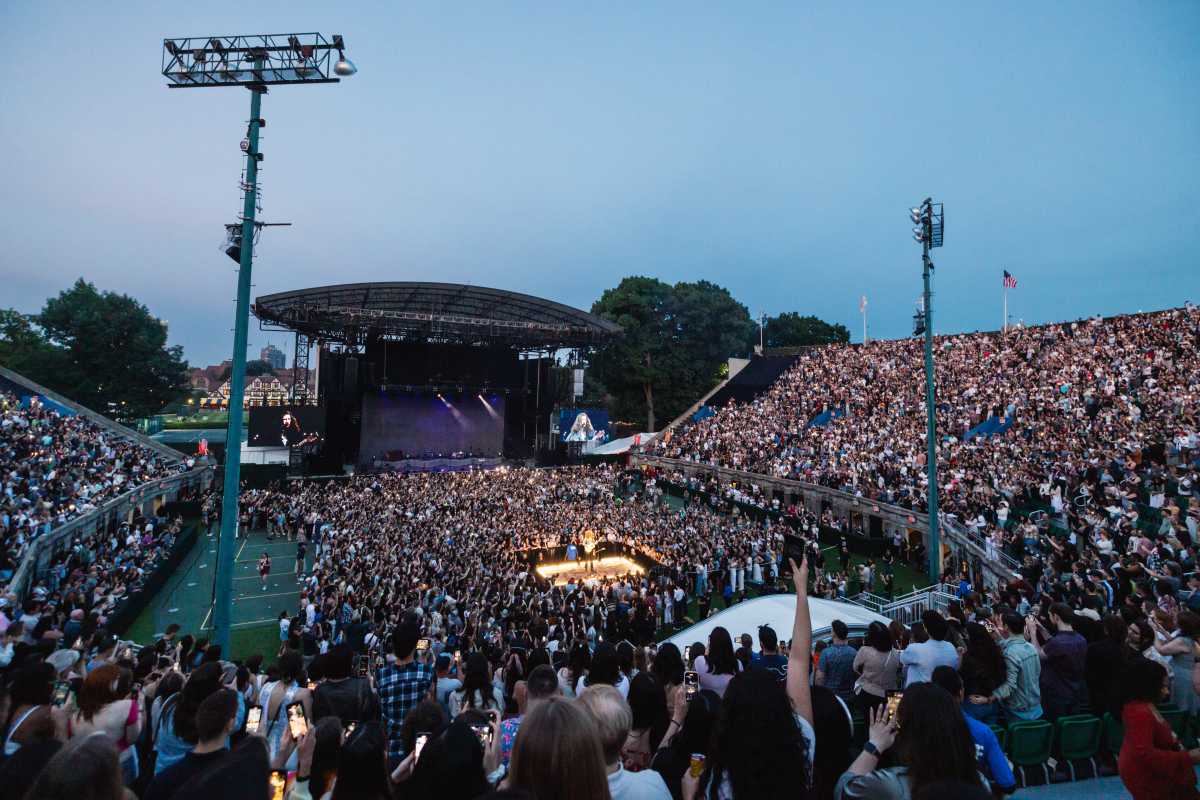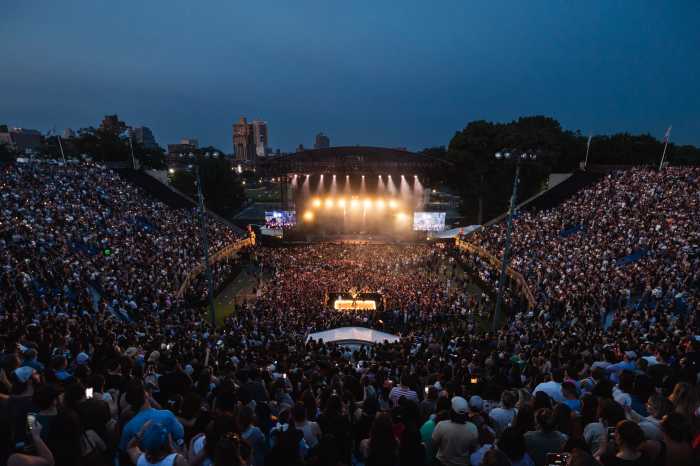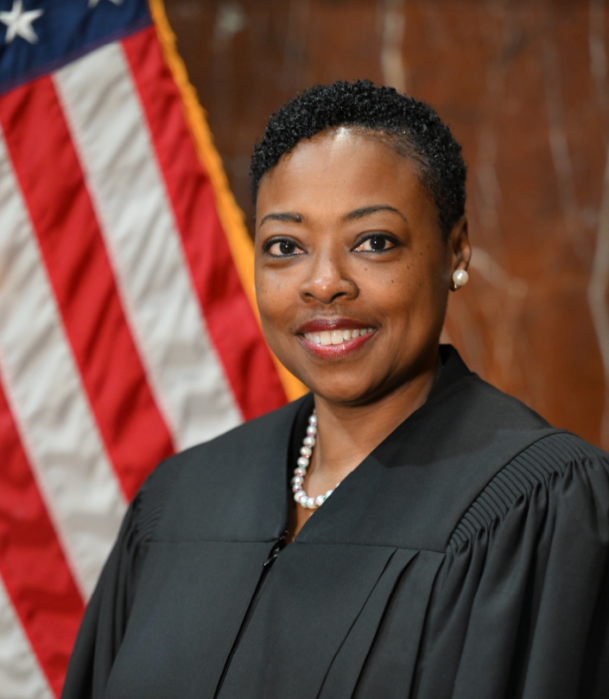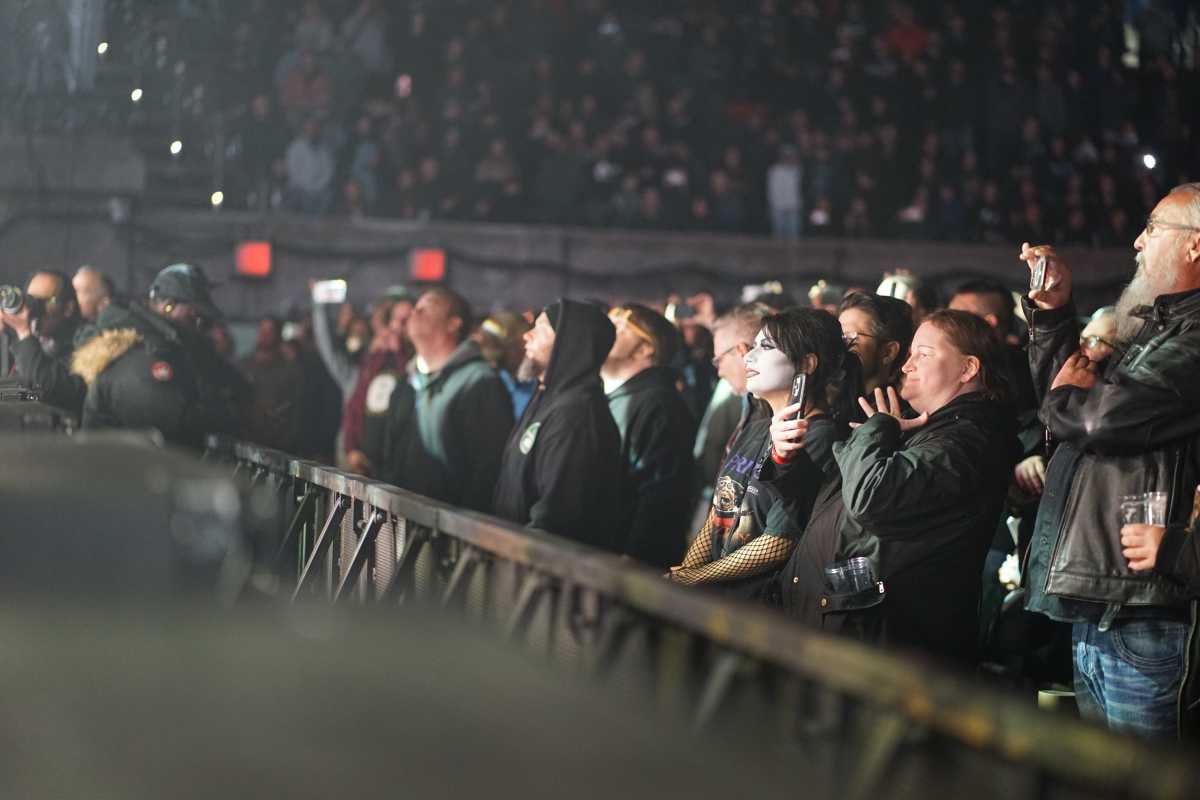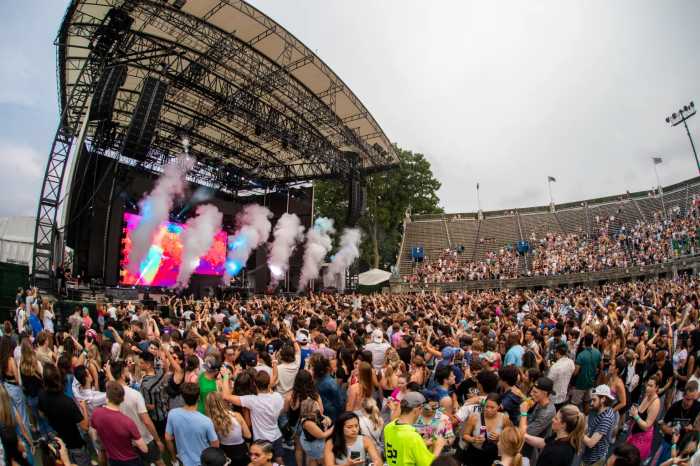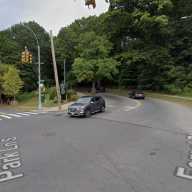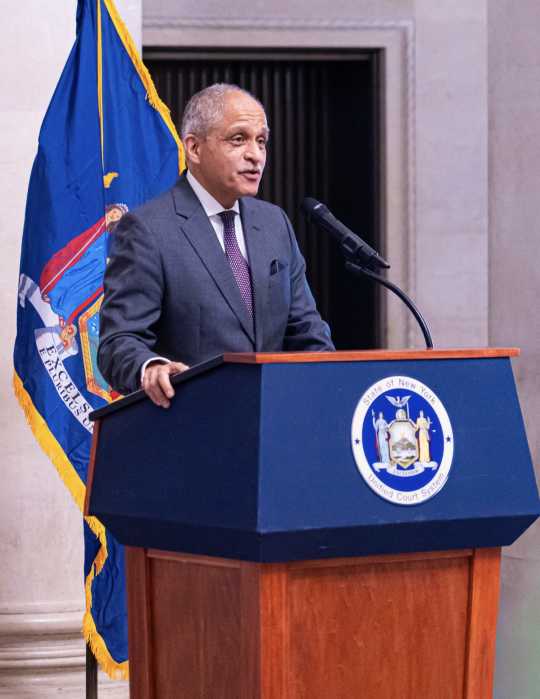The operators of Forest Hills Stadium have accused the Forest Hills Gardens Corporation (FHGC), a neighboring homeowners association, of “sidestepping” the courts and trying to “bully” the NYPD. The accusation follows a letter from FHGC to the NYPD threatening legal action if police continue to issue permits for the stadium’s 2025 concert season.
West Side Tennis Club, which owns and leases the stadium to concert operators, and Tiebreaker Productions, which operates concerts at Forest Hills Stadium, are currently embroiled in a legal battle with FHGC, a homeowners association whose members live by the stadium.
In October, Queens County Supreme Court Judge Joseph J. Esposito dismissed five of seven claims brought against West Side Tennis Club and Tiebreaker by FHGC, including claims of trespassing and zoning violations. Esposito did not dismiss claims of public and private nuisance, however.
FHGC argues that the quality of life in the area surrounding the stadium has deteriorated as the number of concerts at the venue has increased in recent years.
On concert nights and festival days, thousands of attendees walk through the area to get to the stadium, which has a capacity of 12,000. Affidavits submitted in the lawsuit claim that some attendees, who tend to be intoxicated, have entered the vestibules of their apartment buildings and left trash or bodily fluids. FHGC also stated that a number of streets and sidewalks are closed when events are taking place at the venue.
However, Esposito noted that the Club works with the NYPD, MTA and LIRR to ensure events at Forest Hills Stadium are minimally disruptive to the local community. He noted that closures are enforced by the NYPD, directives that neither the Club nor FHGC can override.
Esposito also encouraged both parties to continue working with the NYPD to ensure that concertgoers do not stray from designated routes and venture into residential areas.
On Nov. 14, however, lawyers representing FHGC penned a letter to Michael Gerber, deputy commissioner of legal matters at the NYPD, voicing a number of complaints about policing plans at the stadium and threatening legal action if the NYPD continues to issue sound amplification permits for the 2025 concert season and implement a program to close private streets on event days.
FHGC alleges that the NYPD’s actions over the past two years have been “unlawful,” stating that the issuance of sound amplification permits undermines the purpose of New York City’s Administrative Code, which seeks to “prevent any activity that ‘disturbs the public peace.”
The letter further contends that FHGC did not issue a license to the West Side Tennis Club, Tiebreaker or the NYPD to close the streets surrounding the stadium for the 2023 and 2024 seasons. Lawyers representing FHGC wrote that the homeowners association owns the streets surrounding the stadium, giving it the power to issue licenses for street closures. They further stated that FHGC has no intention of issuing a license to close the streets for the 2025 concert season.
FHGC’s attorneys additionally accused the NYPD of “seizing private property to facilitate one entity’s commercial endeavors” and claimed that street closures are unconstitutional, writing that the Constitution prohibits state actors from taking private property unless for a public event. The letter also contended that local residents are entitled to “just compensation and due process.”
The attorneys concluded the letter by requesting a response by Dec. 15 and stating that FHGC reserves “all legal remedies for addressing the city’s actions”.
Akiva Shapiro, an attorney representing West Side Tennis Club and Tiebreaker, strongly rebuked the FHGC letter, describing the document as “false and defamatory.”
“The Club and Tiebreaker deeply regret that FHGC is now dragging the NYPD into this morass through FHGC’s threats of further litigation against the NYPD; strongly object to FHGC’s preposterous claims that any of the NYPD’s actions to date have been ‘unlawful,'” Shapiro wrote in a letter to Gerber.
Shapiro further stated their hope that the NYPD would not be “cowed into submission by an angry but frivolous letter” from FHGC.
The letter further stated that West Side Tennis Club has been a “model neighbor,” frequently engaging with the local community and elected officials. It is also noted that the Club is a member of FHGC and is the largest paying dues member in the organization.
Shapiro also wrote that Forest Hills Stadium’s concert series plays an important role in the local community by attracting tens of thousands of people who patronize local businesses.
Referring to the lawsuit brought against the Club and Tiebreaker, Shapiro accused FHGC of carrying out “an extortionate scheme by threatening to physically block access to or egress from the Stadium unless the Club paid several million dollars to FHGC.”
In the original letter to Gerber, FHGC attorneys wrote that the trial court has “ruled twice” that concerts are creating a public and private nuisance, citing noise levels, street closures and concertgoers obstructing traffic. Shapiro dismissed the assertion as “false,” stating that the decision not to dismiss the two nuisance claims “does not constitute a determination” on either claim.
Shapiro wrote that “surviving dismissal” does not mean that FHGC has produced evidence to support either of its nuisance claims.
Both claims are set to be determined at some point in 2025.
In October, Esposito acknowledged that “the record is more than sufficient to establish that FHGC suffers injury distinct from the community at large,” but that does not fall under the jurisdiction of public nuisance, which would have to apply to the entire Forest Hills community.
In a past lawsuit against the stadium, brought on by Concerned Citizens of Forest Hills, Esposito dismissed nuisance claims entirely.
In a statement, Shapiro described FHGC’s letter as a “blatant attempt” to circumvent Esposito’s decision to dismiss five of the seven claims brought against Forest Hills Stadium. He is also confident that the court will find in favor of the Club and Tiebreaker in the two claims that have not been dismissed.
“The Forest Hills Gardens Corporation’s letter to the NYPD is a blatant attempt to sidestep court orders after numerous judges have instructed the homeowners association board to abide by the NYPD’s public safety directives,” Shapiro said in a statement.
“It is unfortunate that individuals who don’t represent the will of the Forest Hills community as a whole are now resorting to trying to bully the NYPD with frivolous threats. The Stadium remains confident that it will prevail on all remaining claims.”
Christopher Rizzo, Esq., representing FHGC, said in a statement that the residents’ organization “remains focused” on the ongoing litigation against West Side Tennis Club. He added that FHGC “fully expects” that the City will carry out its “legal obligations.”
“The City and the NYPD are not part of that litigation and FHGC will therefore not be commenting about them in the context of this litigation, which is critically important to protecting the lives and homes of thousands of Queens residents,” Rizzo said in a statement.
“As for the City, it obviously has a duty to comply with various constitutional and legal standards and the residents of our community fully expect the City to respect and carry out its legal obligations.”
Esposito dismissed five claims in October, including a Breach of Declaration claim, which cited a 1913 declaration of land ownership where the historic stadium and surrounding residences exist today.
In his motion to dismiss the claim, Esposito ruled that the 1913 declaration does not “condition the Club’s rights to hold public events” or partner with “third parties in arranging such events.” He further noted that, contractually, the purpose of the West Side Tennis Club is not limited to just tennis, despite its name.
The judge also dismissed a “trespassing” claim. Since the streets are technically owned by FHGC, they claimed in the lawsuit that the “ticket booths, bag check stations, barricades and VIP areas” go beyond the walking and driving allowed that would not be considered trespassing.
Esposito also ruled that FHGC failed to establish that the music festivals are a “noxious, offensive or dangerous trade or business that must be enjoined.”
Attorneys representing Forest Hills Stadium took the dismissal of the majority of claims as a win.

